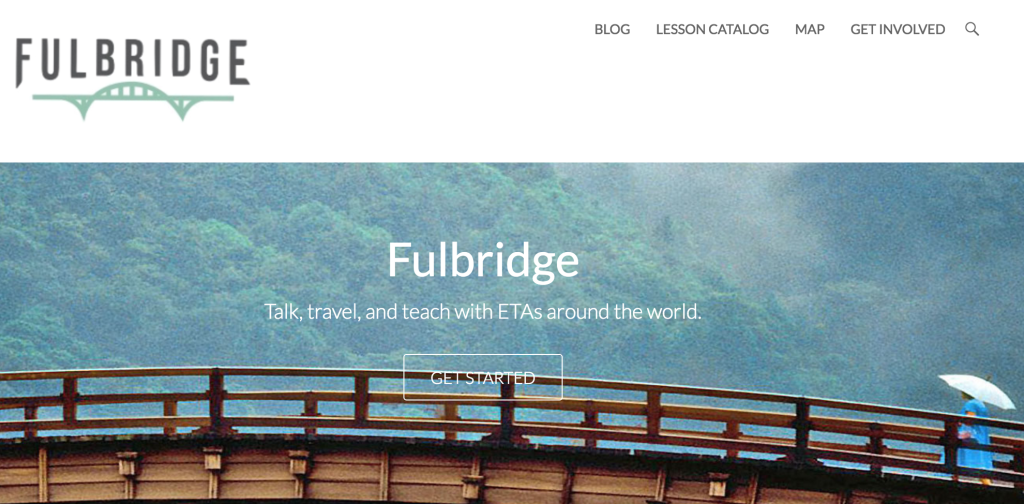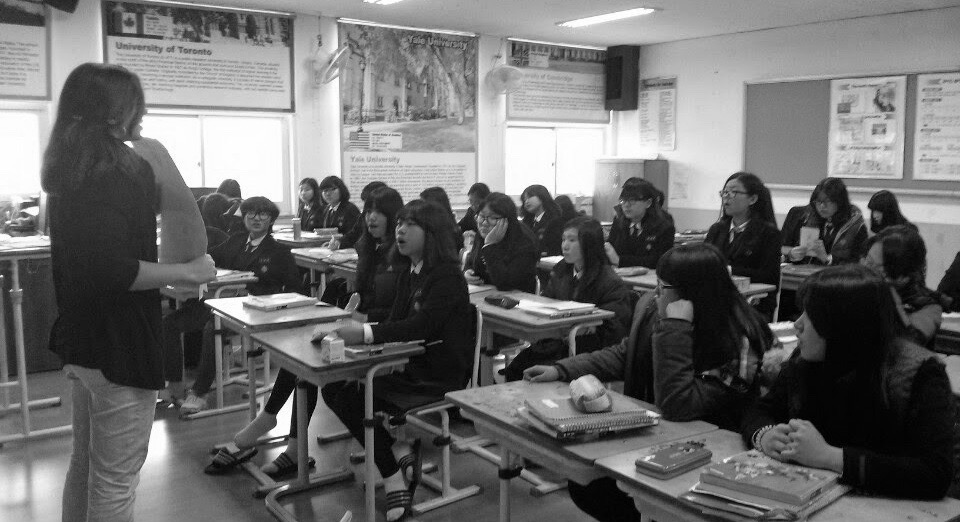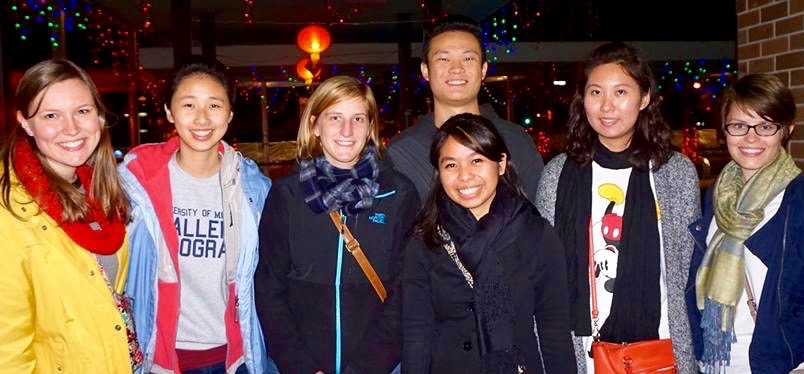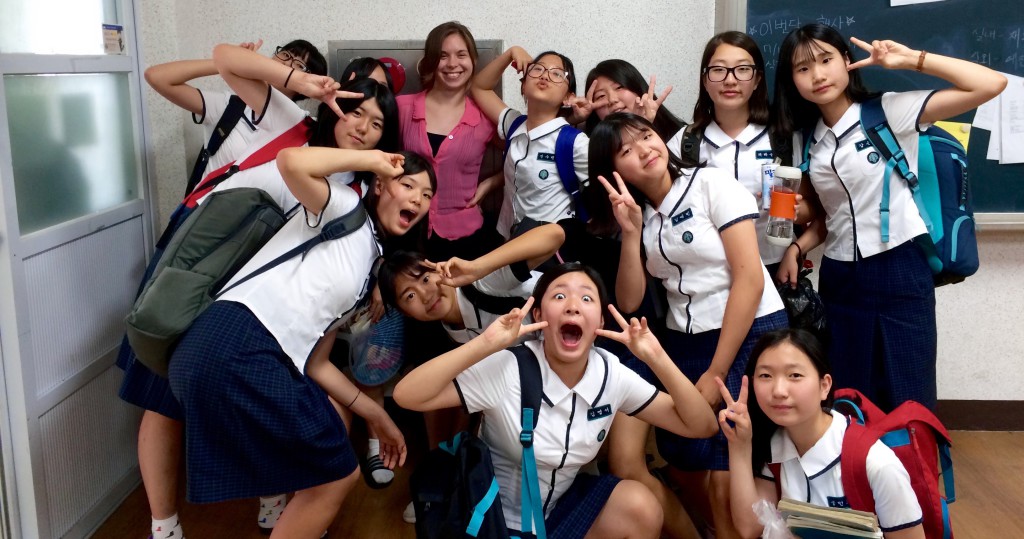By Guest Author Zoë Gioja
Zoë Gioja, a former Fulbright English Teaching Assistant (ETA) to Korea, founded the site Fulbridge.org with a mission to create a more interconnected Fulbright community, where ETAs from across the globe can connect through travel, teaching, and cultural exchange. The site currently in beta-testing with over 80 users. Zoë writes about her inspiration for the site and plans for this new, global initiative.
A friend and I were sitting in the back of a tuk-tuk, riding back from the temples at Angkor in tired but happy silence. The great thing about a tuk-tuk – an open-air vehicle that goes maybe 30 mph at top speed – is that you’re not isolated behind glass windows: you can see everything, smell everything, hear everything. As we drove, I tried to take it all in– the women hawking water, the chickens wandering in the dust of the road, the empty open-air restaurants, deserted in the heat of late afternoon. I saw a group of girls dressed in matching blue skirts and collared shirts, walking along the path beside us. They were talking to each other, laughing – the uniforms making it clear that they were walking home from school. As we passed them by, I found myself wondering: are these girls in public school or private school? What’s the education system like here? What’s English education like? Do they have foreign English teachers like they do in other places? And if they do, how does it compare?
I was, at that time, about halfway through my Fulbright grant year, where I was an English Teaching Assistant in South Korea – so education was at the forefront of my mind. I’d been there for about six months, just long enough to understand that I was just starting to get to know the country. Still, as I traveled through Cambodia, I realized that my six months gave me an access to Korea that I didn’t have here. In Cambodia, I felt I was only seeing the surface of things, and I had questions. I wanted to be able to experience, even if only through someone else, some small part of what I’d started to gain by living somewhere, rather than simply visiting.
Wouldn’t it be awesome, I thought, if I could find another Fulbrighter here? Were there even any Fulbrighters here to talk to? I found out later that, though there aren’t any Fulbright ETAs in Cambodia, there are plenty throughout other countries in Southeast Asia – and I wanted to meet them.
But there were few easy and centralized ways for me to contact current ETAs in say Thailand, Mongolia, or Germany. No established method that would enable me to get a picture of their day-to-day lives, see what they were teaching in their classrooms and what their students were like. While traveling through Southeast Asia, I realized what I wanted was a global Fulbright network – one where we could swap entertaining stories of cultural and teaching challenges, share lesson plans, and even visit each other’s schools. What if, during winter break, I could not only visit temples and palaces, but schools and classrooms as well?
I was immediately excited about the potential for this idea. I saw it as a way for Fulbrighters to gain more insight into the international education landscape, to use each other as a resource for educating and learning from one another. I believed it would further Fulbright’s mission – “to promote mutual understanding between people of other countries and people of the United States” – by a sort of multiplier effect. What if, for example, Korean students could interact with Indonesian students through a pen-pal program? Connecting Fulbrighters to each other, it seemed to me, could open up all sorts of less explored avenues for cross-cultural exchange – not only between grantees, but also among our students.
I returned to Korea, bought the domain name, and immediately started gathering other Fulbrighters to work on the project.
One Year Later
Two South Korea ETAs, Dawn Barcelona and Rachel Brooks, had just arrived in Yilan, Taiwan. It was their winter break – a time that South Korean schools have longer holidays, enabling Fulbright ETAs to travel abroad. Waiting at the bus station was a group of Taiwan ETAs, who took Rachel and Dawn to a night market to sample the local street food and show them around the city.
Before traveling to Taiwan, Dawn and Rachel used the Fulbridge Map to get in touch with other Fulbrighters in the country. The map – an interactive tool that enables Fulbrighters discover one another’s placements – acts a bit like a Fulbright couchsurfing network, with one addition: organizing school exchanges. An ETA from Laos planning a trip to Seoul can click on the city to see who’s interested in meeting up, hosting, or even co-teaching.
Dawn and Rachel met Taiwan ETAs, drove around the cities on motorcycles, and even visited Taiwan ETAs’ schools.
“What made Taiwan such a memorable vacation was meeting Fulbrighters from other countries and seeing the Fulbright Program’s spirit of cultural exchange and mutual understanding play out on a wider scale,” said Dawn. “It’s easy for me to forget that Fulbrighters work all around the world while I am so invested in the community we have in Korea. Fulbridge helped us to see Taiwan through a more personal lens, and there were things I would have never been able to do without the help of the Taiwan ETAs.”
“I stayed in a Taiwan ETA’s apartment for a night,” said Rachel, describing her Taiwan visit, “and she and I stayed up late talking and bonding over our teaching methodology and experiences. It was wonderful to share stories. We gave each other innovative ideas for lessons and activities that were met with success in our classrooms. She and I might even do a pen pal exchange.”
This was, in many ways, what I had wanted to experience a year ago when traveling through Southeast Asia, and it was exciting to see the idea put into action.
“The allure of Fulbridge is the link to the mission of Fulbright – sparking cross cultural interaction,” says Matthew Noah Baker, an ETA in Taiwan, and our Taiwan Country Representative for the project. “Not only is it a great way for ETAs to learn about other countries and cultures, but it allows us to reflect on our experiences through a second-level cultural exchange.”
It was exciting, therefore, to hear about South Korea ETAs not only meeting ETAs in Taiwan, but also visiting Taiwanese schools, meeting the students, and swapping stories and anecdotes over a school lunch with local Taiwanese teachers – all of which expands the mission of cultural exchange.
With the help of a multi-country team in South Korea, Taiwan, and Malaysia, we’ve begun to establish Fulbridge in several countries, and we aim to keep growing from there. “We’re still in the beginning stages, but we’re excited about the future,” says Kevin Duong, South Korea ETA and second-in-command on the Fulbridge team. “I see a lot of potential in our Lesson Catalog, which we’re curating to highlight lessons and teaching tips from ETAs worldwide, and I can’t wait to launch more features for ETAs to share their personal stories, projects, and ideas.”
Not only are ETAs benefiting from Fulbridge, they are excited to take it further, and that is equally, if not more, rewarding. The sharing of stories and ideas has always been a central part of my desires for the Fulbridge project, and I knew, even at the beginning, that the idea can only go as far as ETAs around the globe are willing to take it. I hope that Fulbrighters will continue to use the site to collaborate, meet one another, and build bridges between their countries.
Interested in getting involved? ETAs can join the community by putting their pins on the map. Fulbridge is always looking to expand their team. Fulbright alumni are also encouraged to share their lesson plans. Go to Fulbridge.org to learn more.
Zoë Gioja was a Fulbright English Teaching Assistant in 2014-2015, where she taught at an all girls’ middle school in Mokpo, Korea. She now works as the National Fellowships Coordinator at the University of Notre Dame.
© Victoria Johnson 2016, all rights reserved.



